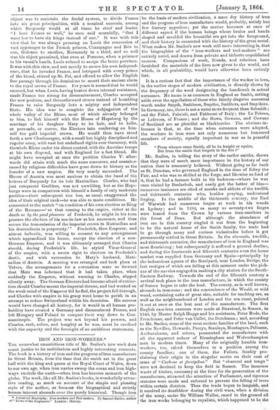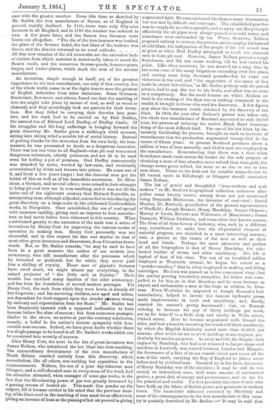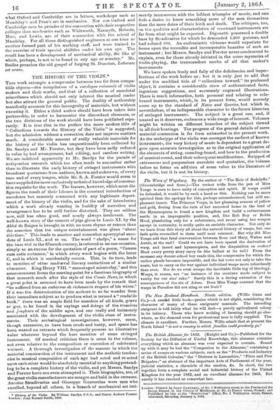IRON AND IRON-WORKERS.* •
THE somewhat unambitious title of Mr. Smiles's new work does scant justice to its multifarious and highly interesting contents. The book is a history of iron and the progress of iron manufacture in Great Britain, from the time that the smith sat in the great ball with the king and queen at the Royal Court of Wales, down to our own age, when iron navies sweep the ocean and iron high- ways encircle the earth—when iron has become monarch of the globe. The work, like all Mr. Smiles's books, is wonderfully attrac- tive reading, as much on account of the simple and pleasing style of the author, as because the biographical and strictly human interest abounds over the purely historical. Though iron • Industrial Biography: Iron•workers and Tool-nsakera By Samuel Smiles, author of "I.Ives of the Engineers." London: Murray.
object was to maintain the feudal system, to divide France be the basis of modern civilization, a mere dry history of iron into six great principalities, with a nominal suzerain, among and the progress of iron manufacture would, probably, satisfy but which Burgundy would at all times be chief and leader. few literary appetites ; yet the matter becomes at once of "I love France so well," be once said scornfully, "that I different aspect if the human beings whose brains and hands want her to have six kings instead of one." It was with this shaped and moulded the bountiful ore get into the foreground, view that he was always pressing on Louis the concession of and their history is connected with the history of the great metal.
vast appanages to the French princes, Champagne and Brie to What makes Mr. Smiles's new work still more interesting is, that one, Guienne to another, Normandy to a third, and so well the biographies of the " iron-workers and tool-makers " are was his object perceived, that even at Peronne, when a prisoner entirely novel, and drawn from private and hitherto unpublished in his vassal's bands, Louis refused to assign the latter province. sources. Companions of work, friends, and relations have It was with this view, and not merely to assure his own independ- furnished the materials of the lives now given to the world, and ence, that he invaded France, and intrigued with every prince which, in all probability, would have otherwise been entirely of the blood, stirred up St. Pol, and offered to allow the English lost.
free passage through his dominions to assert their ancient claim It is a curious fact that the importance of the worker in iron, to the royal crown of France. For years it seemed that he would in the earlier stages of modern civilization, is directly shown by succeed, but when Louis, having beaten down internal resistance, the frequency of the word designating the handicraft in actual made France too strong for dismemberment, Charles accepted surnames. No name is as common in England as Smith, setting the new position, and thenceforward strove instead of humbling aside even the appellation of those who faintly disguise ancestral might have occupied at once the position Charles V. after- Mr. Smiles, in telling the story of the earlier smiths, shows
wards did attain with much the same resources, and unembar- that they were of much more importance in the history of' our reused by religious difficulties have gone down to history as the nation than is commonly believed. Without going as far back founder of a new empire. He very nearly succeeded. The as St. Dunstan, who governed England in the time of Edwy the House of Austria was most anxious to obtain the hand of the Fair, and who was so skilled at the forge, and likewise so fond of heiress of Burgundy for its heir Maximilian. Charles, who had it, that he had a furnace built in his bedroom—where be was just conquered Gneldres, was not unwilling, but as the Haps- once visited by Beelzebub, and easily got the better of him— burgs were in comparison with himself a family of only moderate numerous instances are cited of monks and abbots of the twelfth position—their subsequent rise has, as usual, exaggerated the and thirteenth centuries who, besides praying, understood idea of their original rank—he was able to make conditions. He forging. In the middle of the thirteenth century, the Earl consented to the match " on condition of his own election as King of Warwick had numerous forges • at work in his woods of the Romans—' so that coming to the empire, either at the at Lydney ; and in 1282, as many as seventy-two forges death or by the good pleasure of Frederick, he might in his turn wore leased from the Crown by various iron-smelters in procure the election of his son-in-law as his successor, and thus the forest of Dean. But although the abundance of secure the transmission of the imperial crown to Maximilian and iron ore in this country singled it out from the beginning his descendants in perpetuity.' " Frederick, then Emperor, and to be the natural home of the Smith family, the trade had almost imbecile, was willing to consent to any arrangement to go through many and curious vicissitudes before it got which aggrandized his house, except the election of a non- permanently settled in Great Britain. In the eleventh, twelfth, German Emperor, and it was ultimately arranged that Charles and thirteenth centuries, the manufacture of iron in England was should, during Frederick's life, be styled Vicar-General most flourishing ; but subsequently it suffered a general decline, of the empire, with a sworn right to election on Frederick's and during the fourteenth and fifteenth centuries even the home death, and with succession to Mary's husband, Maxi- market was supplied from Germany and Spain—principally by militia of Austria. A meeting was arranged and took place at the industrious agents of the Steelyard, near London Bridge, the Troves, the arrangements for a coronation were so forward last vestiges of which are falling at this moment under the pick- that Metz was informed that it had taken place, when axe of the navvies engaged in making a city station for the South- suddenly the Emperor, without warning to Charles, slipped Eastern Railway. Towards the end of the fifteenth century a silently away. The German Electors had become afraid of extinc- revival took place in the iron manufacture, in which the county tion should Charles mount the imperial throne, and had worked on of Sussex began to take the lead. The county, as is well known, the weak mind of the Emperor till be fled, the project fell through, abounds in ironstone ; and the convenience of the Weald, or wild and Charles with empire in his grasp went home to perish in an wood, containing oaks of great size, suitable for smelting ore, as attempt to reduce Switzerland within his dominion. His success well as the neighbourhood of London and the sea coast, pointed would have changed all history, for it would in all human pro- it out at once as the best seat of the manufacture. The first bability have created a Germany and dismembered France, and English cast-iron cannons were made at Buxstead, in Sussex, in left Hungary and Poland to conquer their way down to Con- 1543, by Master Ralph Hogge and his assistants, Peter Bude, the stantinople. The project was not beyond his powers, and Frenchman, and Peter van Collet, the Dutchman ; and, according Charles, rash, sullen, and haughty as he was, must be credited to Mr. Smiles, some of the most ancient families of the land, such with the capacity and the foresight of au ambitious statesman. as the Nevilles, Howards, Percys, Stanleys, Montagues, Pelhams, Ashburnhams, and others, prosecuted the manufacture with all the apparent ardour of Birmingham and Wolverhampton men in modern times. Many of the originally humble iron- workers, too, raised themselves to a position among the county families ; one of them, the Fullers, frankly pro- claiming their origin in the singular motto on their coat of arms of " Carbone et forcipibus." But "charcoal and tongs " were not destined to keep the field in Sussex. The immense waste of timber, necessary at the time for the prosecution of the manufacture, attracted the attention of Parliament, and rigorous statutes were made and enforced to prevent the felling of trees within certain districts. Thus the trade began to languish, and it received its deathblow during the civil wars, when a division of the army, under Sir William Waller, razed to the ground all the iron works belonging to royalists, which happened to be the
case with the greater number. From this time, as sketched by Mr. Smiles, the iron manufacture of Sussex, as of England in general, rapidly declined. In 1740, there were only fifty-nine furnaces in all England, and in 1788 the number was reduced to two. A few years later, and the Sussex iron furnaces were blown out altogether. "The din of the iron hammer was hushed, the glare of the furnace faded, the last blast of the bellows was blown, and the district returned to its rural solitude All that now remains of the old ironworks are the extensive beds of cinders from which material is occasionally taken to mend the Sussex roads, and the numerous furnace-ponds, hammer-posts, forges, and cinder-places, which mark the seat of the ancient manufacture.
After Henry Cort, the next in the list of great inventors was James Neilson, who introduced the hot blast into iron-smelting. The extraordinary development of the iron manufacture of North Britain resulted entirely from this discovery, which nevertheless, like all others, met nothing but opposition in the commencement. Neilson, the son of a poor day-labourer near Glasgow, and a self-educated man in every sense of the word, had his attention attracted, when manager of some gas works, to the fact that the illuminating power of gas was greatly increased by a passing stream of heated air. This made him ponder on the subject, till it became settled in his mind that the previous heat- ing of the blast used in the smelting of iron must be as effective in giving an increase of heat as the passing of hot air proved in giving
augmented light. He communicated his ideas to some ironmasters, but was met by ridicule and contempt. The established practice was to supply air as cold as possible, and to carry out the principle effectively the air pipes were always passed over cold water, and sometimes even surrounded by ice. When, therefore, Neilson proposed entirely to reverse the process, and to employ hot instead of cold blast, the indignation of the people of the old school was as great as when Dud Dudley attempted to teach the charcoal men to burn pit coal. However, James Neilson proved a tough Scotchman, and did not cease working till he had carried his point. Like other inventors, he was worried for a long time by law-suits—one of the many litigations extending over five years, and costing some forty thousand pounds—but he came out victorious in the end, and "the supporters of the cause of free trade in others inventions," as Mr. Smiles politely calls the patent pirates, had to pay due tax to his brain, and allow him to retire on a competency. But the small fortune on which Neilson re- tired in the evening of his days was as nothing compared to the wealth it brought to those who used his discovery. A few figures may show the immense result obtained by the discovery of the blast. In 1829, the year after Neilson's patent was taken out, the whole iron manufacture of Scotland amounted to only 29,000 tons, the process of reducing the native Black Band ironstone being of the most difficult kind. The use of the hot blast, by im- mensely facilitating the process, brought on such an increase of manufacture that the production augmented twenty-fold in the course of fifteen years. At present Scotland produces above a million of tons of iron annually, and 50,000 men are employed in the manufacture. Remembering that there was a time when Scotchmen made raids across the border for the sole purpose of obtaining a store of iron plunder, more valued then than gold, the change seems great indeed, the more so as due to one or two men alone. Those on the look-out for suitable statue-heroes to fill vacant spots in Edinburgh or Glasgow should remember James Neilson.
The list of genial and thoughtful " iron-workers and tool- makers" in Mr. Smiles's biographical collection embraces alto- gether some twenty names, among those not yet mentioned being Benjamin Huntsman, the inventor of cast-steel ; David Muahet, Dr. Roebuck, grandfather of the present representative of Sheffield ; Joseph Bramalt, Henry Maudslay, Joseph Clement ; Murray of Leeds, Roberts and Whitworth of Manchester; James Nasmyth, William Fairbairn, and some other less known names. The lives of all these heroes of industry, who, each in a different way, contributed to make iron the all-powerful element of material progress, are sketched in a most interesting manner, with a glance at the hearts of the men as well as their head and hands. Perhaps the most attractive and perfect of all the biographies is that of Henry Maudslay, the cele- brated builder of steam and other machinery. His life is typical of that of his class. The son of an invalided soldier employed at Woolwich arsenal, he began his career as a "powder-monkey," that is, a boy employed in making and filling cartridges. He then was passed on to the carpenters' shop ; but the smithy proving irresistibly attractive, his father was 'com- pelled to let him go in that direction, and he soon became as expert and enthusiastic a man at the forge as whilom St. Dun- stan. From Woolwich he migrated to Joseph Bramah's lock manufactory, helped to invent the famous hydraulic press, made improvements in tools and machinery, and, finally, married his master's pretty housemaid ; but, on Bratnah refusing to increase his pay of thirty shillings per week, set up for himself in a little shop and smithy in Wells street, Oxford street. Here he became acquainted with Brunel the elder, and lent a hand in executing his wonderful block machinery, by which the English Admiralty saved more than 20,0001. per annum; after which he set to work building steam-engines, par- ticularly for marine purposes. As early as 1816, the Regent, with engines by Maudslay, who had now removed to larger shops and smithies at Lambeth, was started between London and Margate, the forerunner of a fleet of steam vessels which now cover all the seas of the earth, carrying the flag of England to places never before trod by civilized man. Summed up in dry facts, the career of Henry Mandalay was of the simplest ; it may be said he was merely an industrious man, with some amount of mechanical genius, a great deal of energy and perseverance, and an eye for the practical and useful. Yet it is precisely this class of men who have built up the fabric of British power and greatness in modern times. The immediate influence exercised by Mandalay and some of his contemporaries in the iron manufacture of this coun- try is quaintly described by Mr. Smiles :—" It may be said that what Oxford and Cambridge are in letters, workshops such as Maudslay's and Penn's are in mechanics. Nor can Oxford and Cambridge men be prouder of the connection with their respective colleges than mechanics such as Whitworth, Nasmyth, Roberts, Muir, and Lewis, are of their connection with the school of Maudelay. For all these distinguished engineers at one time or another formed part of his working staff, and were trained to the exercise of their special abilities under his own eye. The result has been a development of mechanical ability, the like of which, perhaps, is not to he found in any age or country." Mr. Smiles preaches the old gospel of forging St. Dunstan, Laborare est orare.


















































 Previous page
Previous page